The Second Brain: Unraveling Gut Intelligence's Role in Health
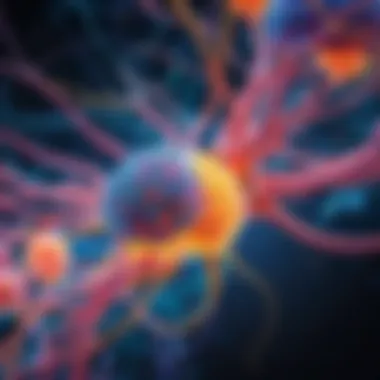
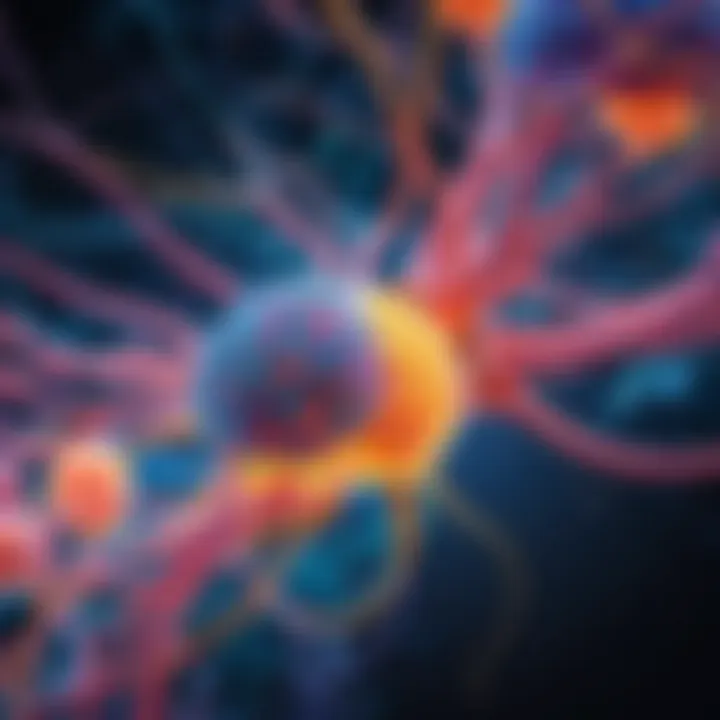
Intro
The link between the gut and the brain is an emerging field into the potentials of the body. More than just a center for digestion, the gut is potentially a sophisticated 'decision-maker.' Known commonly as the second brain, its impact goes beyond mere digestion.
Understanding the microbiome's role is crucial. The gut hosts trillions of microorganisms, influencing everything from mood to memory. This article explores every part of this interrelation and what gut health means for overall well-being. As awareness of this connection increases, the implications for both mental health and physical health become clearer.
This journey through the gut involves examining neural connections and biochemical functions, alongside practical advice on how to maintain gut health amid modern challenges.
Understanding the Concept of the Second Brain
Exploring the concept of the second brain provides dimension to our understanding of how human bodies function. This idea, rooted in decades of neurology, emphasizes the substantial role that the gut plays in not only digestion but also emotional and cognitive processes. Since this article delves into these complexities, gaining insight into what constitutes the second brain becomes essential. It uncovers deeper health implications linked to gut health.
Definition and Historical Background
The term second brain refers principally to the enteric nervous system, comprising over a hundred million neurons situated in the gastrointestinal tract. This system is responsible for overseeing various digestive processes without direct involvement from the brain. Historians and medical professionals alike recognize that understanding this component significantly influences our approach to health and well-being.
Researchers first explored the gut's nervous system extensively in the late 19th century, committing findings to medical literature. Yet, it wasn't until the late 20th century that clear connections to brain function were duly acknowledged. Current scientific interests revolve not merely around the gastrointestinal actions but also encapsulate the biochemical interactions that extend to mood regulation, informed by gut biome health.
The Importance of the Gut-Brain Connection
Understanding the interplay between the gut and the brain is vital for holistic health practices. This connection highlights various pathways through which the brain regulates digestive reactions and, conversely, how gut activities can influence mood and cognition. Key aspects of this relationship include:
- Biochemical signaling: Gut hormones and neurotransmitters are produced by the gut, which can directly impact central nervous system functionality.
- Microbial influence: The gut microbiome plays a significant role in shaping behavioral outcomes, contributing to the increasing field of psychobiotics—probiotics designed to benefit mental health.
- Physical reactions: Certain gut conditions correlate to stress and anxiety symptoms, thereby underscoring how intertwined digestive health is with overall emotional states.
Furthermore, fostering a better understanding of the gut-brain axis could lead to therapeutic advances. It opens avenues for interventions that are not solely limited to psychiatric treatments but also encompass dietary and lifestyle changes, thus promoting a sphere of well-being grounded in empirical evidence.
Understanding the second brain emphasizes that caring for the gut is not merely about dietary choices; it is fundamentally linked with emotional wellness and cognitive health.
The Anatomy of the Gut's Nervous System
The anatomy of the gut's nervous system holds significant importance in understanding the role of the gut as the body's 'second brain.' This section examines the structure and functionality of the enteric nervous system (ENS) and how its intricate architecture governs not only digestive processes but also influences overall health and well-being.
Structure of the Enteric Nervous System
The enteric nervous system comprises a vast network of neurons embedded in the walls of the gastrointestinal tract. This system is often referred to as the
The Microbiome's Role in Gut Health
The gut microbiome serves an essential function in gut health and overall well-being. Microbiomes include trillions of microorganisms, such as bacteria, fungi, and viruses, that inhabit our gastrointestinal tract. Understanding how these microorganisms influence gut function provides insights into maintaining health and preventing disease.
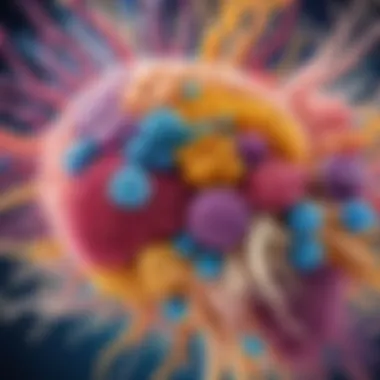
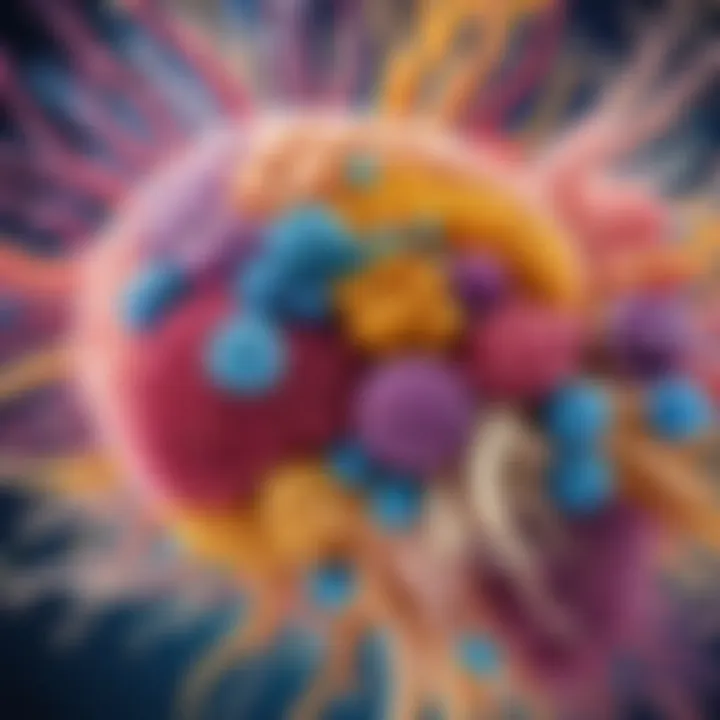
Understanding the Gut Microbiome
The gut microbiome is not just a random collection of organisms. It includes a complex ecosystem that evolves over time based on various factors. These factors can include diet, lifestyle, medications, and environmental influences. The composition and diversity of the gut microbiome can directly be tied to digestive health, immune responses, and even particular brain functions.
Research indicates that a balanced microbiome can assist with digestion by breaking down food that the stomach can’t effectively process. These microbes also synthesze vital nutrients, such as vitamins B and K, which are indispensable for various bodily functions.
Furthermore, the gut microbiome protects against harmful pathogens, reducing the risk of infections and gastrointestinal-related disorders.
Impact on Digestion and Metabolism
The microbiome exhibits a notable impact on digestion and metabolism. It aids in fermenting dietary fibers that the human body cannot digest by itself. This leads to the production of short-chain fatty acids (SCFAs), which are vital for colon health and provide energy for gut cells. Moreover, SCFAs play a role in regulating glucose metabolism and may contribute to lowering the risk of obesity and diabetes.
An unbalanced microbiome, often instigated by poor dietary choices, antibiotics, or stressful lifestyles, can lead to digestive issues like bloating, gas, or even more chronic conditions such as inflammatory bowel disease.
Understanding this connection underscores the importance of proactively nurturing gut health through informed dietary and lifestyle choices.
Microbial Diversity and Its Benefits
Microbial diversity within the gut microbiome is crucial for overall health. Studies indicated that a wide variety of microbes can improve resilience against diseases and adverse health conditions. Each microbe plays specific roles in digestion, immune function, and overall homeostasis.
Key benefits of microbial diversity include:
- Enhanced digestion and nutrient absorption.
- Robust immune system responses.
- Lower risks of allergies and autoimmune conditions.
- Improved mental health outcomes due to the gut-brain axis.
In contrast, a lack of diversity is often correlated with problems, including obesity, metabolic syndrome, and mental health disorders. This illustrates the intricate balance needed for optimal functioning and highlights why maintaining a diverse diet rich in fibers can promote a healthy microbiome.
"A diverse microbiome acts like a buffer, providing numerous ways to process food and respond to environmental changes."
Maintaining and promoting microbiome diversity thus becomes a key component of gut health, radically affecting various aspects of health holistically.
Interplay Between Gut and Brain
The connection between the gut and brain is essential for understanding the complexities of the body's second brain. This interplay is not only fascinating but also crucial for maintaining well-being and mental health. The gut functions as a signaling center, influencing brain activity, emotional regulation, and overall physical health. Disturbances in this relationship may result in many health issues, making it a central topic of continued research.
Gut Hormones and Neurotransmitters
Hormones and neurotransmitters secreted by the gut play a significant role in this dynamic. The gastrointestinal tract produces various hormones that affect brain signaling. Serotonin, for instance, is primarily synthesized in the gut and is well-known for its influence on mood, stability, and general happiness. Further, hormones like ghrelin and leptin also directly communicate satiety and hunger signals to the brain, regulating appetite and food intake.
The bidirectional communication between the gut and brain ensures that while the brain can send messages about stress or emotional conditions, the gut provides data about its current state, which may induce hunger or satiety. This often-governed interaction indicates how gut health intricately influences our mental and emotional well-being.
Influence on Mood and Mental Health
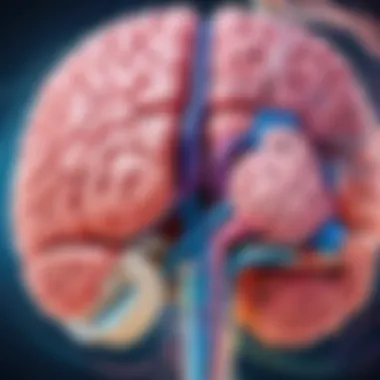
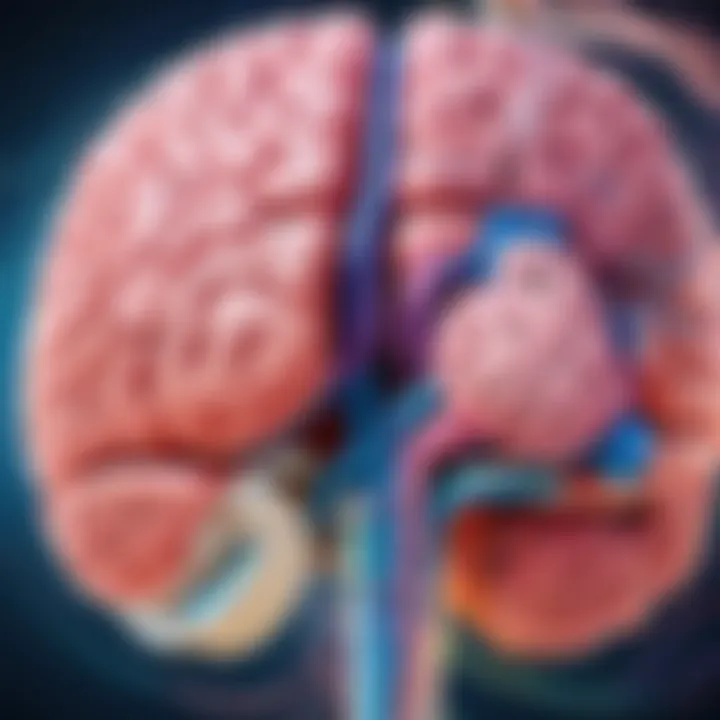
The intricate relationship between gut health and mood settlements cannot be overstated. A healthy gut microbiome can improve mood status due to the direct dialogue through various neurochemical pathways. When gut bacteria break down certain nutrients, they send signals that may elevate the presence of mood-regulating neurotransmitters in the brain. Disruption in this microbial balance can ultimately lead to alterations in mental health, correlated with anxiety and depression disorders.
Research indicates that individuals suffering from depression tend to have altered microbiomes. Experiments show that using probiotics can restore some of these microbiotic balances, potentially reducing symptoms of depression and associated anxiety. Thus, supporting gut health could serve as a foundational therapy in battling mood-related issues.
Neurological Disorders Linked to Gut Health
The interplay between gut health and neurological disorders is an area of growing study. Conditions such as Parkinson's disease and Multiple Sclerosis have been explored for their connection to gut flora. It has been suggested that the alterations in gut bacteria may either contribute to the development or worsen the symptoms of such disorders.
A prominent theory proposes that systemic inflammation initiated by gut dysbiosis triggers neurological complications. Furthermore, signals from the gut's nervous system may contribute to aberrant neurological function, exacerbating symptoms or leading to new bipolarity. Continuous research in this field aims to better highlight correlations, aiming for novel intervention strategies.
To maintain optimal brain function and prevent potential neurological issues, understanding the gut's impact on brain health remains pivotal, and research continues to unlock specific pathways involved.
Gut Health and Overall Wellness
Gut health plays an integral role in overall wellness, influencing various physiological and psychological outcomes. Recognizing the significance of a well-functioning gut is vital for anyone interested in well-being. Many people overlook this connection, yet it is necessary for thinking about how health is more than just physical traits. A thriving gut implicates a harmonious balance among microorganisms, ensuring optimal nutrient absorption, metabolic regulation, and proper immune function.
> Gut health significantly contributes to keeping your immune system functional.
Connection to Immune Function
The enteric nervous system, which connects the gut to the central nervous system, interacts closely with the gut microbiome and the immune system. A well-balanced gut microbiome generates various metabolites, influencing immune responses in both direct and indirect manners. More specifically, certain beneficial bacteria enhance the production of immune-related molecules. These include short-chain fatty acids (SCFAs), which are beneficial for gut health. Consequently, a healthy gut microbiome serves as a crucial player in defending the body against pathogens and diseases.
Specific Points on Immune Function:
- Promotes tolerogenic responses, meaning the immune system can distinguish between harmful pathogens and beneficial substances.
- Deters harmful bacterial growth through competition and production of inhibiting substances.
- Bolsters gut integrity, reducing inflammation and, in turn, minimizing the risk of chronic infections.
Impact on Inflammatory Processes
Inflammation is a natural part of the body’s response to injury and infection, but chronic inflammation can have detrimental effects. Dysbiosis, or imbalanced gut flora, is often at the root of this issue. Research has shown that an unstable gut microbiome can lead to increased gut permeability, commonly known as
Practical Insights for Gut Health Maintenance
Gut health plays a pivotal role in overall wellbeing, as it influences various physiological and psychological functions. Maintaining this health is not just beneficial but essential. Today, an increasing body of evidence points to the significance of a well-balanced gut, which can contribute to improved mood, enhanced cognitive capacity, and stable metabolic rates.
Dietary Recommendations
Diet has a critical impact on gut health. It can define the structure of the gut microbiome and its function.
- Foods rich in fiber, such as whole grains, fruits, and vegetables, promote beneficial bacterial growth.
- Fermented foods, including yogurt, sauerkraut, and kimchi, are essential because they combine various live bacteria, which can help restore and maintain healthy gut flora.
- Foods high in sugars and processed ingredients can provoke dysbiosis, a microbial imbalance in the gut. Avoiding these can stabilize gut ecosystems.


In general, focusing on a diverse diet ensures a wide spectrum of nutrients supporting gut health. When those microbes thrive, they perform various functions like synthesizing vitamins or breaking down complex carbohydrates.
Lifestyle Choices That Support the Gut
Life choices also have a distinct relationship with gut health. Consider the following aspects:
- Regular Exercise: Physical activity aids digestion and enhances the functioning of the gut microbiome by increasing its diversity.
- Stress Management: Emotional wellbeing directly affects gut health. Practices like mindfulness, yoga, and meditation can mitigate stress-induced gut disruption.
- Sleep Hygiene: Developing favorable sleep patterns is vital since poor sleep can impact the gut microbiome negatively. Aiming for seven to nine hours of quality sleep helps sustain metabolism and gut function.
- Engaging in workouts three to five times a week can boost overall gut function.
These elements, when combined, create an environment conducive to a healthier gut, promoting better overall health outcomes.
The Role of Probiotics and Prebiotics
Both probiotics and prebiotics merit special consideration in gut health discussions:
- Probiotics: These live microorganisms confer health benefits specific to gut health when consumed in adequate amounts. They can help in balancing gut flora during digestive issues.
- Prebiotics: Non-digestible food components, such as inulin and fructooligosaccharides, act as food for good bacteria, thus boosting their growth and activity in the gut. These include some fibers found in onions, garlic, and bananas.
Integrating both into your diet can substantially advance your gut health by fostering bacteria that guard against potential harmful pathogens and enhancing digestion. Successful support of gut flora may lead to broader health benefits, including increased immunity and reduced gastrointestinal disorders.
Overall, these insights can guide individuals toward enriching their gut health practices and better understanding the complexity of their second brain.
Future Directions in Gut-Brain Research
The focus of gut-brain research is becoming more relevant within the scientific community. New understandings about the gut's role as a second brain have opened doors to explorers in health and wellness. As we deepen our insights, several areas warrant increased attention for future research.
Studies show a strong link between gut health and mental well-being. Investigating this relationship can offer benefits beyond current knowledge. Enhanced understanding promotes developing strategies for various health issues, such as anxiety and depression. Thus, the implications of further research are considerable.
In upcoming sections, let's analyze emerging scientific studies alongside potential therapies and interventions that promise great results in navigating this intricate line connecting gut and brain.
Emerging Scientific Studies
Recent scientific studies highlight the microbiome’s impact on overall health. These studies explore how microbial composition affects various physical and mental conditions. For example, researchers are investigating the gut microbiota's influence on the central nervous system. This influence can potentially explain why individuals with gastrointestinal disorders often report psychological symptoms.
A comprehensive view of the
End
The concept of a second brain situated in the gut holds significant relevance in understanding complex interactions that govern our health and well-being. From the intricate signaling pathways linking the gut and the brain to the contribution of gut microflora in mood regulation, comprehending these relationships can inform better lifestyle choices. The gut's role is of utmost importance regarding mental health, illustrating how dietary choices and gut functionality can profoundly affect psychological outcomes.
Furthermore, extensive research supports the connection between gut health and various diseases, including not only gastrointestinal disorders but also conditions such as depression and anxiety. It fosters realization about how maintaining a ppropriate gut microbiome can enhance overall physical and mental robustness. Readers should recognize that an understanding of this second brain extends beyond mere academic curiosity; it equips individuals with knowledge about nutritional and lifestyle changes that could bring about substantial improvements in their well-being.
The Importance of Understanding the Gut's Role
Comprehending the gut's functionality broadens our perspective on health. The gut's influence on advanced biological processes helps illuminate how interconnected body functions are. To grasp why it is seen as a second brain gives insights into digestion, immunological responses, and even emotional health. In turn, operational health implies a more personal control over one's body.
- The gut houses an extensive array of neurons and receptors, illustrating its sophistication. Researchers see this intricate polyphony of biological factors as critical to optimizing health.
- Adequate gut health can lead to countering adverse effects from modern stressors, supporting better resilience and enhancing quality of life.
- Integration with mental health highlights why strategies aimed at improving gut function potentially pan out beneficially in therapy.







